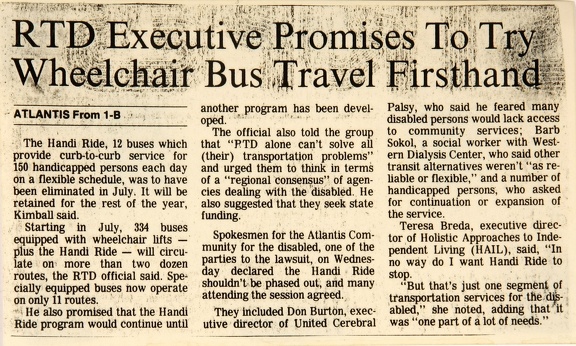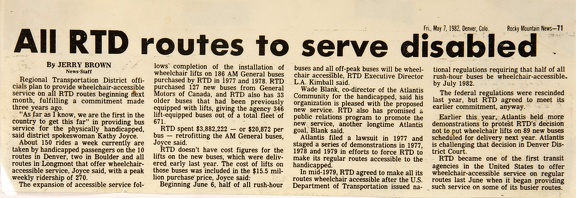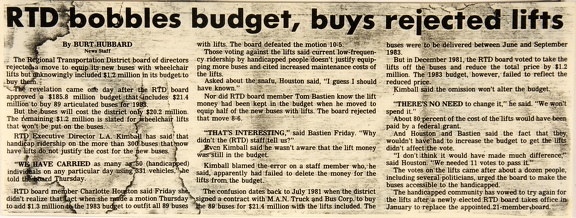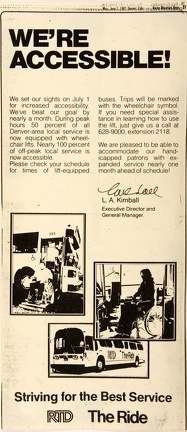- 語言Afrikaans Argentina AzÉrbaycanca
á¥áá áá£áá Äesky Ãslenska
áá¶áá¶ááááá à¤à¥à¤à¤à¤£à¥ বাà¦à¦²à¦¾
தமிழ௠à²à²¨à³à²¨à²¡ ภาษาà¹à¸à¸¢
ä¸æ (ç¹é«) ä¸æ (é¦æ¸¯) Bahasa Indonesia
Brasil Brezhoneg CatalÃ
ç®ä½ä¸æ Dansk Deutsch
Dhivehi English English
English Español Esperanto
Estonian Finnish Français
Français Gaeilge Galego
Hrvatski Italiano Îλληνικά
íêµì´ LatvieÅ¡u Lëtzebuergesch
Lietuviu Magyar Malay
Nederlands Norwegian nynorsk Norwegian
Polski Português RomânÄ
Slovenšcina Slovensky Srpski
Svenska Türkçe Tiếng Viá»t
Ù¾Ø§Ø±Ø³Û æ¥æ¬èª ÐÑлгаÑÑки
ÐакедонÑки Ðонгол Ð ÑÑÑкий
СÑпÑки УкÑаÑнÑÑка ×¢×ר×ת
اÙعربÙØ© اÙعربÙØ©
主頁 / 相冊 / Denver RTD 65
上傳日期 / 2016

 ADAPT (104)
ADAPT (104)
Denver Post Tuesday, January 19th, 1982 Editorials, Opinion, 2, 3 Weather 4 Ski Report, 4 Suit over Bus Lifts Hits RTD By Howard Pankratz, Denver Post Legal Affairs Writer Some of Denver’s handicapped, who believe the Regional Transportation District has broken a promise to install wheelchair lifts on 89 new buses, turned that belief into action Monday by suing the district. In a lengthy brief filed in Denver District Court, seven wheelchair-bound individuals and the Atlantis Community for the disabled accused the district of violating both state and civil law and a settlement reached in federal court several years ago. In that settlement, alleges the suit, RTD agreed that all new buses would have wheelchair-lift equipment. But that promise has been broken, said the suit, which asks that RTD be required to install lifts on 89 new buses due for delivery beginning next year and on all new equipment in the future. The Monday suit is based on RTD’s having contracted for 89 new buses, worth $21.3 million. The suit says that 80 percent of the purchase price is to be paid by the federal government. Originally, said lawyer John Holland, who represents the handicapped, all the buses were to have had lifts to make them accessible to the handicapped. But last November, the RTD board decided not to have lifts installed. The total cost of the lifts would be $1.1 million, with the federal government again paying 80 percent of the cost. The suit alleges that it wasn’t the cost, technical feasibility or the maintenance of the lifts that caused them to be dropped, but rather a decision by RTD to use the new buses on “express bus service” from which the handicapped are to be excluded. This, claimed the wheelchair-bound complaints, blatantly violates the state’s civil rights act. Reacting to that alleged broken promise, handicapped individuals demonstrated on the RTD properly, for three straight days in early January, an action that caused the district to go to court seeking an order banning such demonstrations. However, late last week, Denver District Judge Daniel Sparr told both sides he feared that if he issued a restraining order against the handicapped, it would only widen the gulf between the two sides. He noted that the handicapped had legal avenues to follow if they felt a promise had been broken. On Friday, heeding Sparr’s advice, the two sides reached an accord, whose points will be made public February 2. RTD lawyers Alan E. Richman and Russ Richardson said Monday that RTD has a policy of not commenting on such pending lawsuits. ADAPT (103)
ADAPT (103)
RTD Executive Promises To Try Wheelchair Bus Travel Firsthand ATLANTIS From 1-B The Handi Ride, 12 buses which provide curb-to-curb service for 150 handicapped persons each day on a flexible schedule, was to have been eliminated in July. It will be retained for the rest of the year, Kimball said. Starting in July, 334 buses equipped with wheelchair lifts — plus the Handi Ride - will circulate on more than two dozen routes, the RTD official said. Specially equipped buses now operate on only 11 routes. He also promised that the Handi Ride program would continue until another program has been developed. The official also told the group that “RTD alone can’t solve all (their) transportation problems" and urged them to think in terms of a “regional consensus” of agencies dealing with the disabled. He also suggested that they seek state funding. Spokesmen for the Atlantis Community for the disabled, one of the parties to the lawsuit, on Wednesday declared the Handi Ride shouldn't be phased out, and many attending the session agreed. They included Don Burton, executive director of United Cerebral Palsy, who said he feared many disabled persons would lack access to community services; Barb Sokol, a social worker with Western Dialysis Center, who said other transit alternatives weren't “as reliable or flexible,” and a number of handicapped persons, who asked for continuation or expansion of the service. Teresa Breda, executive director of Holistic Approaches to Independent Living (HAIL), said, “In no way do I want Handi Ride to stop. “But that’s just one segment of transportation services tor the disabled,' she noted, adding that it was “one part of a lot of needs.” ADAPT (102)
ADAPT (102)
Rocky Mountain News Friday, May 7, 1982 All RTD routes to serve disabled By Jerry Brown News-Staff Regional Transportation District officials plan to provide wheelchair-accessible service on all RTD routes beginning next month, fulfilling a commitment made three years ago. “As far as I know, we are the first in the country to get this far,” in providing bus service for the physically handicapped, said district spokeswoman Kathy Joyce. About 150 rides a week currently are taken by handicapped passengers on the 10 routes in Denver, two in Boulder and all routes in Longmont that offer wheelchair-accessible service, Joyce said, with a peak weekly ridership of 270. The expansion of accessible service follows completion of the installation of wheelchair lifts on 186 AM General buses purchased by RTD in 1977 and 1978. RTD purchased 127 new buses from General Motors of Canada, and RTD also has 33 older buses that had been previously equipped with lifts, giving the agency 346 lift-equipped buses out of a total fleet of 671. RTD spent $3,882,222 - or $20,872 per bus - retrofitting the AM General buses, Joyce said. RTD doesn't have cost figures for the lifts on the new buses, which were delivered early last year. The cost of lifts on those buses was included in the $15.5 million purchase price, Joyce said. Beginning June 6, half of all rush-hour buses and all off-peak buses will be wheelchair accessible, RTD Executive Director L.A. Kimball said. Wade Blank, co-director of the Atlantis Community for the handicapped, said his organization is pleased with the proposed new service. RTD also has promised a public relations program to promote the new service, another longtime Atlantis goal, Blank said. Atlantis filed a lawsuit in 1977 and staged a series of demonstrations in 1977, 1978 and 1979 in efforts to force RTD to make its regular routes accessible to the handicapped. In mid-1979, RTD agreed to make all its routes wheelchair accessible after the U.S. Department of Transportation issued national regulations requiring that half of all rush-hour buses be wheelchair-accessible by July 1982. The federal regulations were rescinded last year, but RTD agreed to meet its earlier commitment, anyway. Earlier Atlantis held more demonstrations to protest RTD’s decision not to put wheelchair lifts on 89 new buses scheduled for delivery next year. Atlantis is challenging that decision in Denver District Court. RTD became one of the first transit agencies in the United States to offer wheelchair-accessible service on regular routes last June when it began providing such service on some of its busier routes. ADAPT (101)
ADAPT (101)
RTD bobbles budget, buys rejected lifts By: Burt Hubbard News Staff The Regional Transportation District board of directors rejected to move to equip its new buses with wheelchair lifts but unknowingly included $1.2 million in its budget to buy them. The revelation came one day after the RTD board approved a $185.8 million budget that includes $21.4 million to buy 89 articulated buses for 1983. But the buses will cost the district only $20.2 million. The remaining $1.2 million is slated for wheelchair lifts that won’t be put on the buses. RTD Executive Director L.A Kimball has said that handicap ridership on the more than 300 buses that now have lifts do not justify the cost for the new buses. “WE HAVE CARRIED as many as 50 (handicapped) individuals on any particular day using 331 vehicles,” he told the board Thursday. RTD board member Charlotte Houston said Friday she didn’t realize that fact when she made a motion Thursday to add $1.3 million to the 1983 budget to outfit all 89 buses with lifts. The board defeated the motion 10-5. Those voting against the lifts said current low-frequency ridership by handicapped people doesn’t justify equipping more buses and cited increased maintenance costs of the lifts. Asked about the snafu, Houston said, “I guess I should have known.” Nor did RTD board member Tom Bastien know the lift money had been kept in the budget when he moved to equip half of the new buses with lifts. The board rejected the move 8-6. “THAT’S INTERESTING,” said Bastien Friday. “Why didn’t the (RTD) staff tell us?” Even Kimball said he wasn’t aware that the lift money was still in the budget. Kimball blamed the error on a staff member who, he said, apparently had failed to delete the money for the lifts from the budget. The confusion dates back to July 1981 when the district signed a contract with M.A.N. Truck and Bus Corp. to buy the 89 buses for $21.4 million with the lifts included. The buses were to be delivered between June and September 1983. But in December 1981, the RTD board voted to take the lifts off the buses and reduce the total price by $1.2 million. The 1983 budget, however, failed to reflect the reduced price. Kimball said the omission won’t alter the budget. “THERE’S NO NEED to change it,” he said. “We won’t spend it.” About 80 percent of the cost of the lifts would have been paid by a federal grant. And Houston and Bastien said the fact that they wouldn’t have had to increase the budget to get the lifts didn’t affect the vote. “I don’t think it would have made much difference,” said Houston. “We needed 11 votes to pass it.” The votes on the lifts came after about a dozen people, including several politicians, urged the board to make the buses accessible to the handicapped. The handicapped community has vowed to try again for the lifts after a newly elected RTD board takes office in January to replace the appointed 21-member board. ADAPT (100)
ADAPT (100)
Rocky Mountain News, Mon., June 7, 1982 Denver, Colo. p.37 WE’RE ACCESSIBLE! We set our sights on July 1 for increased accessibility. We've beat our goal by nearly a month. During peak hours 50 percent of all Denver-area local service is now equipped with wheelchair lifts. Nearly 100 percent of off-peak local service is now accessible. Please check your schedule for times of lift-equipped buses. Trips will be marked with the wheelchair symbol. If you need special assistance in learning how to use the lift, just give us a call at 628-9000, extension 2118. We are pleased to be able to accommodate our handicapped patrons with expanded service nearly one month ahead of schedule! (signature) L.A. Kimball Executive Director and General Manager 3 PHOTOS (in clockwise order; no credits given). First: A man in a wheelchair sits on a lift into the front door of a city bus. An access symbol is visible by the driver's door of the bus. Second: A woman in a manual wheelchair entering the front of an accessible bus, by the farebox. Three: An RTD bus with RTD "The Ride" written on the side of the bus. In large print at the bottom it says: Striving for the Best Service RTD The Ride